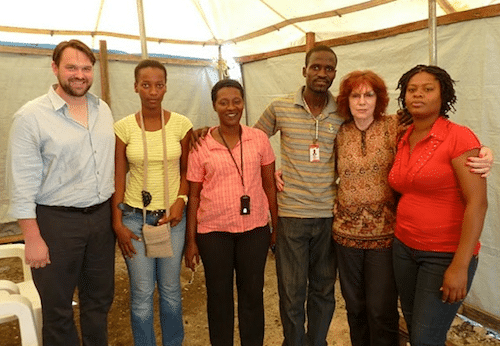Update from Haitian Global Associate
KOFAVIV - Malya Villard-Appolon Partnership Update
Although still trying to gain political asylum during her extended stay in Philadelphia, PA, our Global Associate Malya Villard remains active with the day-to-day operations of the organization (KOFAVIV) she co-founded to combat gender-based violence in Haiti.
Providing her leadership and advice via a remote office out her temporary home in Pennsylvania, Malya has adapted to the challenges of keeping in touch with her colleagues by using Skype conversations and other technology. It is through those means that Malya was able to update us recently on how she and her colleague Earamithe continue the mission of KOFAVIV.

Training is the Key
In her report to us, Malya made it clear that the ongoing identification and training of those men within the community who can be most trusted and depended on to provide a safe environment to the women in the camps, is one of the most important steps to their program being successful. Malya and her team on the ground in Haiti seek out the male agents who can be best trained to share the information and workings of the project with both men and women living in their neighborhoods and communities. They in effect are relied upon to become members of a 'teaching tree' and the most recent numbers indicated by Malya show that over 2,000 persons have been reached and have a first-hand familiarity with the practices of the project – in short, they know how to prevent violence against women and support victims through their recovery.

[quote]The reduction of the violence in whatever forms must be effective to have a society that may benefit of all its rights and dignity. More and more, the KOFAVIV mission is being enacted by both men and women who are the best tools to reeducate the society."[/quote]
- KOFAVIV co-founder Malya Villard-Apollon
Much can be done with little resources – but much more needs to be done ...
Throughout their report, Malya and Earamithe could not understate the importance of having the support and awareness of our own network at the Goldin Institute, in continuing to provide the security of the KOFAVIV offices and the security of women made most vulnerable to all forms of violence. There has been great progress made in reducing the violence and sexual assaults to women and young girls thanks to the project that these two women began in the aftermath of the 2010 Earthquake. However, a recent visit of a local camp (Delmas 33, or the Siló Camp, which is located north of Gerald Bataille Street) demonstrates the need for more work to be done and more support needed.
During their visit, it was discovered tható Camp was not drawing electricity from available sources. The local coordinator of the camp, appointed by the state, decided that it was best to remove the camp from the electrical grid to avoid potential electrical fires. While this in itself may be a needed preventative measure that could save lives by eliminating fires, the most immediate impact is that the camp is blanketed in complete darkness after sunset. As we have learned from Malya and KOFAVIV, the highest number of attacks happen in areas that are underlit. It makes sense, the less light, the more emboldened an attacker will be to commit a crime (it's this simple reality that made the flashlight provided at the camps, one of the first and most effective tools against sexual attackers). Malya and her team have purposed a street-light installation that could be done safely and at minimal cost, but providing the safety against violence that far surpasses the return on the investment.
[quote]We also visited a village called Grace Village, where there are 4 areas and each zone has a name; Peace, Love, Hope, Union ... it is a village well organized but also does not have any lighting."[/quote]
- From Malya's report

Malya's latest update also provided specific numbers showing the effectiveness of the KOFAVIV call center providing immediate help to victims. She also shared the agent scheduling that will continue to ensure there will be adequete coverage for those agents on-the-ground doing the very real work of protecting women against violence.
Find out how you can keep the mission of KOFAVIV going and click here to become more involved.
GI Associate Malya Villard Reports from Philadelphia, PA

Recent interview provides inspiration and plans for future expansion of KOFAVIV
We recently caught up with Global Associate Malya Villard-Appolon, although not in Haiti running KOFAVIV as you would normally expect to see her, but in Philadelphia. Malya's work to reduce all forms of violence perpetrated against women and girls living in camps and communities has made great strides but also put her in a volatile situation. Being the most visible advocate for justice for women who have been attacked has lead to her being forced to seek refuge in Philadelphia until she can safely return to Haiti. Although she is separated from family and forced to temporarily continue her important work from overseas, Malya is as brave and resolved as ever.
We are excited to share this interview with Malya where she speaks passionately and courageously about her work. A quick update of KOFAVIV's work over the past two months reveals that twenty-five trained male agents now work in high risk areas to prevent violence and provide support when women are attacked. In addition, the organization's call center is up and running. As a testament to its importance, within the 15 day period of April 15 to April 30, the center received 153 calls, two from victims of sexual violence, 104 calls for information and 47 calls for advice.
Malya and the KOFAVIV staff will continue, despite constant threats, to ensure the safety of those in their community and a brighter future for Haiti. In the video segment below, Malya speaks about continuing the fight against violence towards women and her plans and hope for the future, despite the personal setbacks suffered.
To find out more on how you can join Malya in the fight to end gender-based violence in Haiti, please follow this link.
Rape Accountability and Prevention in Haiti
Executive Summary of the Project
Since the Jan. 12, 2010 earthquake in Haiti, women and girls living in the internally displaced persons camps face alarming rates of rape and other forms of gender-based violence. In many camps, the rate of gender-based violence has exploded to three times pre-earthquake levels. In the year since the earthquake, our partners at KOFAVIV have documented 640 cases of rape in 2010.
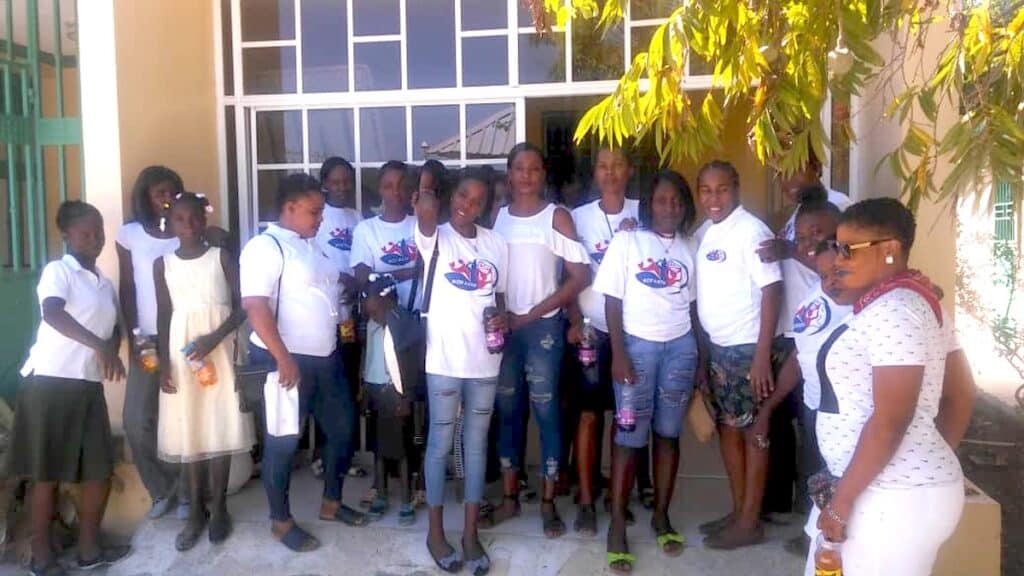
This pilot project is designed to provide security in the Place Petion community of Champ de Mars using women-led, community-based security teams to patrol the camp, discourage and disrupt incidents of gender-based violence and provide necessary escort services to vulnerable residents.
The Goldin Institute has partnered with KOFAVIV, FAVILEK, the Bureau des Avocats Internationaux (BAI), the Institute for Justice and Democracy in Haiti (IJDH) and its network of partners throughout Haiti to build and support a women-led, community-based pilot security platform in one representative displacement camp. This project builds on the strategy developed and implemented by KOFAVIV and FAVILEK, the GI's experience in creating grassroots partnerships for social change and the BAI / IJDH's capacity for legal advocacy in Haiti.
As part of the Rape Accountability and Prevention Project in Haiti, this security platform aims to prevent gender-based violence through the leadership and strategies of women's networks while the work of prosecution is ongoing. This pilot project is designed to serve as a model for community engagement and the provision of security that can be adopted by NGOs and the Government of Haiti.
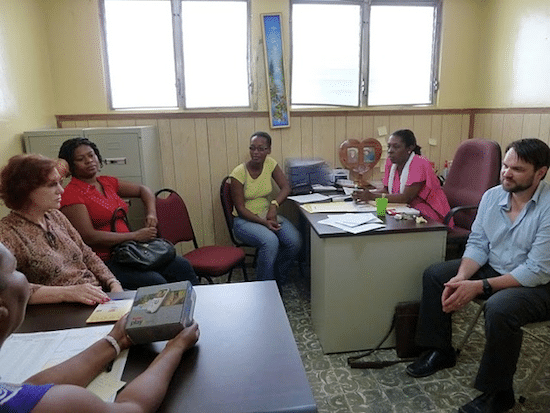
Project Rationale
The problem of GBV in post-earthquake Haiti must be understood within the broader context of the humanitarian response. There is a demonstrated lack of governmental response to sexual violence occurring in the camps. This failure to act appears to have two prongs—the Haitian Government lacks both the political will and the capacity to respond. Furthermore, despite billions of dollars being pledged by the international community for recovery, aid efforts have struggled to meet the basic needs of people living in IDP camps. Having no other options, Haitian grassroots women's groups have resorted to taking charge of their own security. Haitian women are both disproportionately impacted by the crisis and key to their country's recovery.
The reality is that grassroots women's groups have been mostly shut out from the process of crafting a response to the real threat of rapes in the camps. Meanwhile, they have mobilized their own solutions, distributing whistles to women living in camps and organizing groups of women to accompany each other to vulnerable locations like latrines, where many attacks have previously taken place. Each of the women engaged in the project brings a deep commitment to the work, and their life stories are a testament to that dedication.
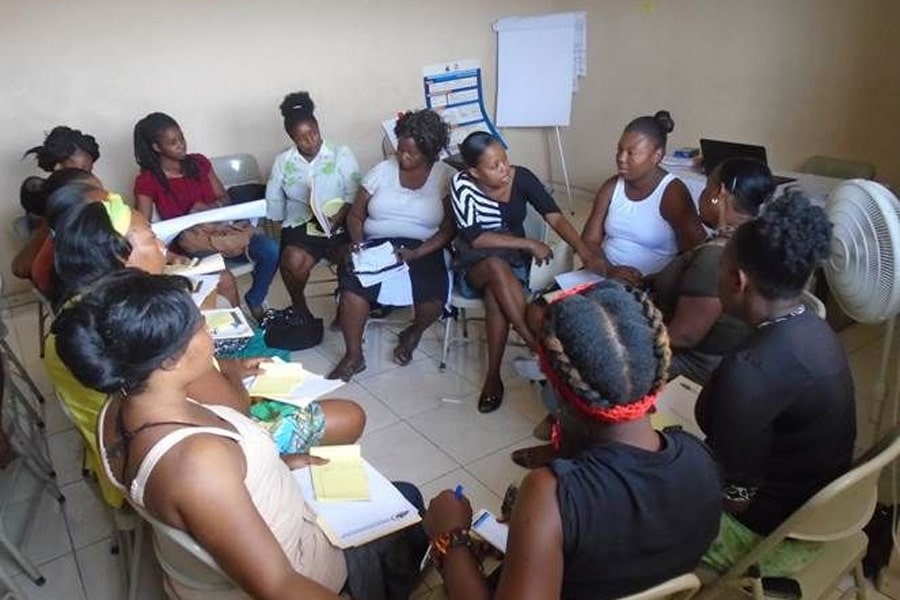
Brief History of the Project
The Haiti Rape Accountability and Prevention Project (RAPP) is designed to respond to the epidemic of rapes against poor women and girls in Haiti in the wake of the Jan. 12, 2010 earthquake. The program includes four closely integrated components: legal advocacy, healthcare, organizing, and public advocacy. RAPP provides individual victims of sexual assault the legal services they need to obtain justice and compensation, while working with allies in Haiti and abroad to transform the social context that underlies the vulnerability of all poor Haitian women to assault. The Project also aims to deter future rape by punishing the perpetrators and forcing a more effective response by law enforcement and the justice system. In February 2011, the Goldin Institute began its association with RAPP with the Camp Security and Sensitization Project.
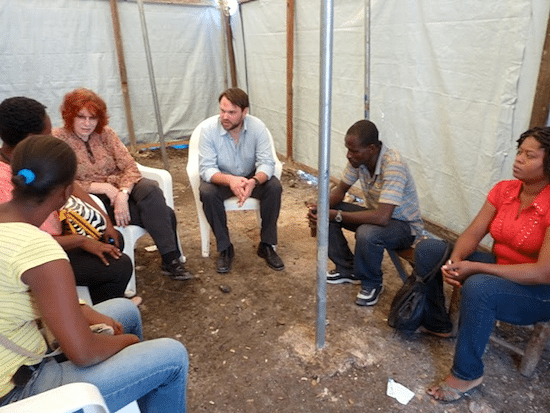
Shared Goals of the Project
This project seeks to substantially improve security and bring an end to gender-based violence in the camp where it is piloted in the Place Petion section of Champ de Mars. In addition to the immediate impact of improved security, we hope that it will provide some meaningful work for security providers and highlight the efficacy of partnering with community based groups, especially those led by women. We hope that this project will serve as a model for the Government of Haiti and relevant NGOs that will be able to scale up this important women-led, community-based initiative.
If successful, this project may also serve as a model for similar grassroots partnerships within the Goldin Institute's global network.
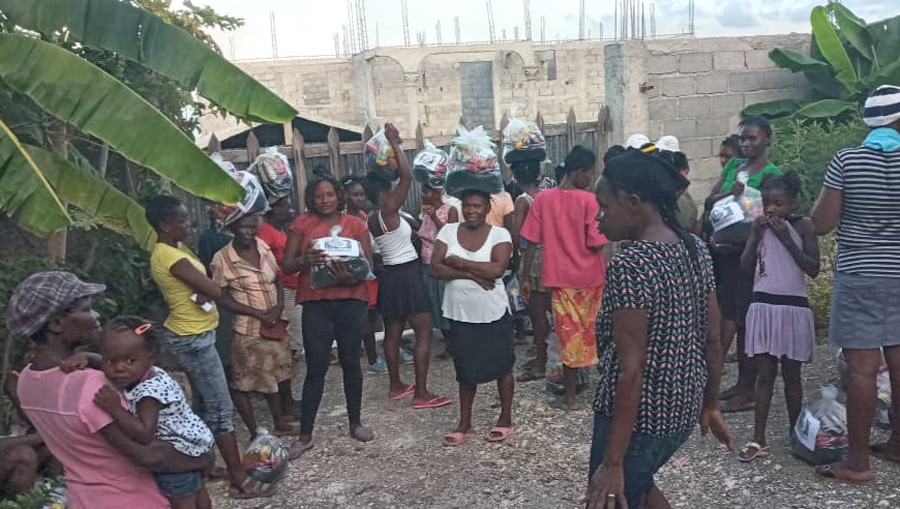
Project Outcomes
- Immediate and sustained reduction in gender-based violence in Champ de Mars.
- Improved sense of security for vulnerable people in Champ de Mars.
- Opportunity for women to design, lead and implement an innovative community based initiative.
- Increased cooperation between women's groups and the network of partners in Haiti.
- Augmented international profile for local partners through sharing the success of the project broadly.
- Opportunity to engage relevant parties in NGOs and the Government to educate them on the need and efficacy of working with grassroots groups, especially women's groups.
